Strong leadership highlight the half century of women's athletics at Purdue

This article appeared first in the The Persistent Pursuit a website dedicated to the best Purdue stories
By Tim Newton, [email protected]
Carol Mertler’s timing couldn’t have been better.
A high school and college coach in several sports, Mertler decided to earn a doctorate at Ohio State in the early 1970s. At the same time, Title IX was enacted, prohibiting sex-based discrimination in any school or educational program that received federal funding. Suddenly, universities around the country needed to start women’s programs from scratch, and they needed experienced administrators to launch them.
Mertler interviewed with several universities, including Ohio State, Iowa, Iowa State, Northwestern, and Purdue. In 1975, athletics director George King offered her a position as assistant athletics director, and she accepted.
A half-century later, Boilermaker women’s sports are still making their mark. Over the past 50 years, the programs have produced two national titles — women’s basketball in 1999 and golf in 2010 — along with six individual NCAA champions, 32 Big Ten team championships, 227 first-team All-Americans and 23 Olympians.

Rocky start
But there were rough times in the beginning. Mertler, who passed away in 2020, told the Mansfield (Ohio) News Journal in 2014 that administrators in her position weren’t always met with open arms.
“They didn’t want us there, and suddenly the government said you had to have us,” said Mertler, who was inducted into the Leroy Keyes Purdue Athletics Hall of Fame in 2013. “The presidents turned to the athletic directors and said you have to have these programs, but we’re not going to give you any money.”
She pointed to the early days when women’s cross country meets were held on the golf course with a gas station across the street with one restroom. Runners would line up to use it before the race, angering both them and the station owner. When Mertler suggested a portable toilet might alleviate the problem, she was told it wasn’t a problem for the men.
“You would have thought I asked for the moon. There’s a little difference there,” she said.
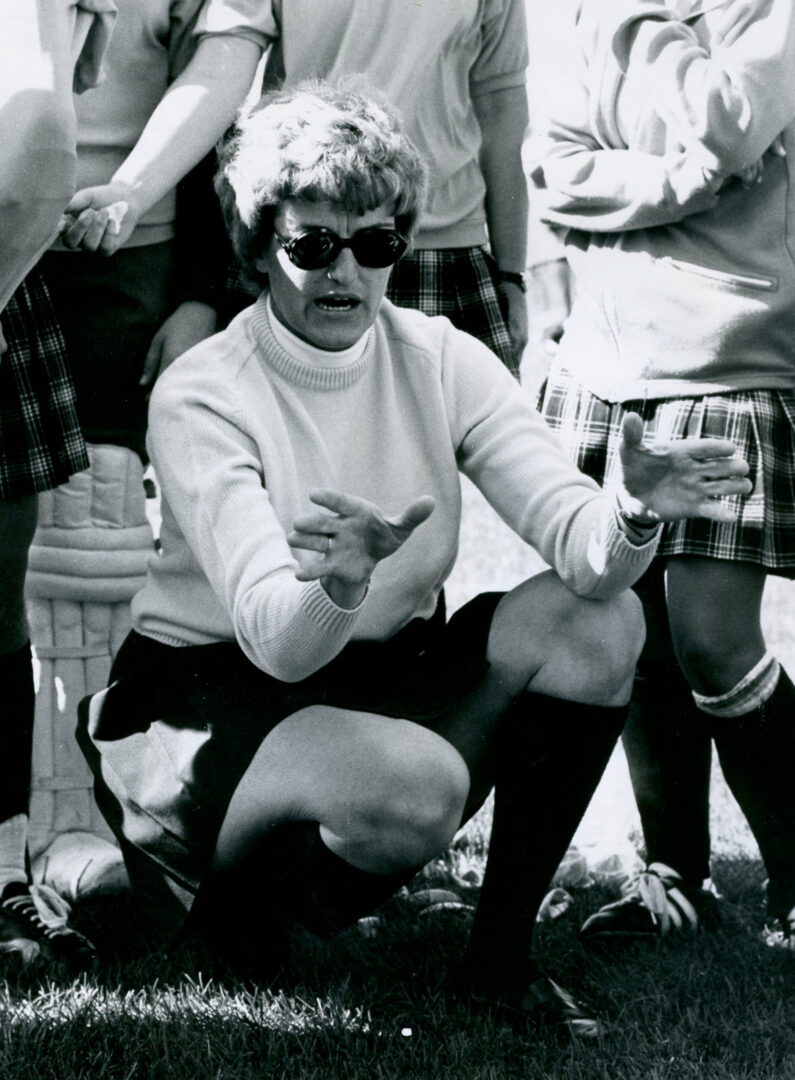
Restrooms were the least of Mertler’s challenges, though. She had to find coaches for all the sports Purdue simultaneously would offer. Since she had experience in field hockey, she decided to coach that team herself at the beginning. Two-time Olympian Jo Ann Grissom was hired for the track team, Laura Pfohl for swimming, Paul Snider for golf, Jocelyn “Cissy” Monroe for tennis and Deborah Gebhardt for basketball.
Mertler went to El Paso, Texas, to find her volleyball coach. Carol Dewey, a native of Brecksville, Ohio, had been a member of the E Pluribus Unum club team that won two national championships and was a member of the U.S. national team in 1974. The following year, Dewey was serving as a statistician for the El Paso-Juarez Sol in the International Volleyball Association when she saw a story in the local newspaper that Mertler had been hired to start women’s sports at Purdue.
Dewey was familiar with Mertler, having played at Muskingum College when Mertler was a coach there. Mertler called Dewey to gauge her interest in the volleyball job.
“She offered me the job and said $5,000 would be the salary,” Dewey recalls. “Growing up in the Midwest, I knew about Purdue and knew that it had a good academic reputation. I told her I needed to think about it for a few days.
“I called her back later and said I would do it sight unseen. She said she had talked to George King, and the salary was going to be $3,000 and not $5,000. Still, I drove to campus and took the job.”
Dewey had no scholarships to offer in 1975 but still found enough talent in campus tryouts to finish 15-16, earning a 5% ($150) raise for the following season. She gave 10 $200 scholarships the following year and then 10 $4,800 scholarships in 1977. Among the first group to receive the major offers was Mary Fischl Wise, the longtime successful head coach at Florida, who recently retired after a 43-year career with more than 1,000 wins.
Under Dewey’s leadership, the Boilermakers won Big Ten championships in 1979, the first year volleyball was a revenue sport, and 1980. In 1982, Purdue made the NCAA regional finals, squeezing out a comeback five-set win over Nebraska to reach the final eight. In 20 years as coach, Dewey posted a 469-256 mark, won four conference championships and was named Big Ten Coach of the Year three times.
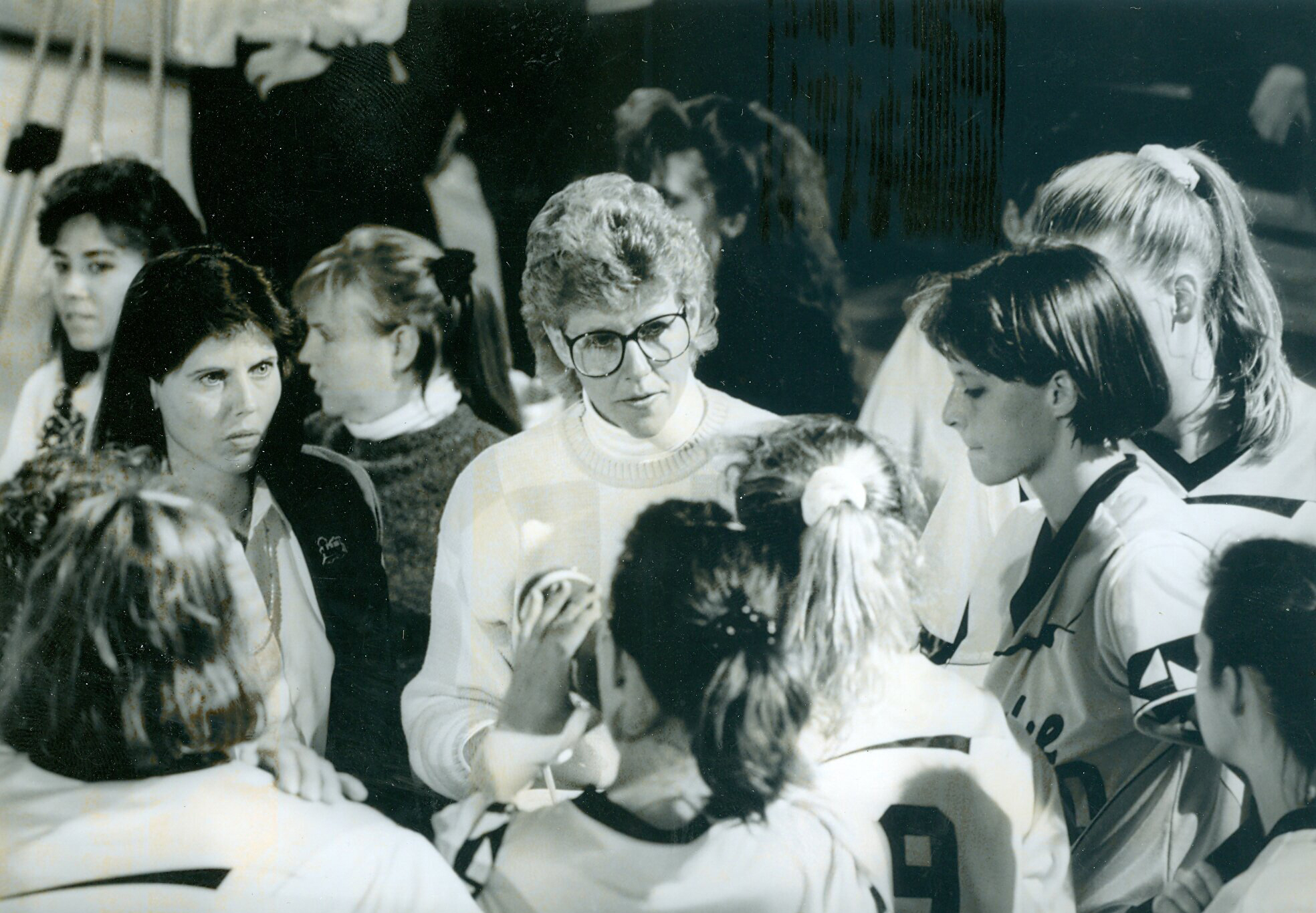
I treated the players as I would like to be treated and gave them responsibility, and I thought the game should be fun.Carol dewey
Former head coach of Purdue Volleyball
Just as impressive, every player who stayed at Purdue for her full four years of eligibility obtained a degree. Dewey was inducted into the American Volleyball Coaches Association Hall of Fame in 2005 and joined Mertler in the LKPAHOF class of 2013.
“Teaching has been my passion my whole lifetime,” Dewey says. “I believe in teaching and education. I treated the players as I would like to be treated and gave them responsibility, and I thought the game should be fun.”

Multitasking needed
Ruth Jones replaced Deborah Gebhardt as women’s basketball coach in 1976, and she also served as field hockey coach. Jones came to Purdue from Ashland College, where she led her team to a 50-10 record over three seasons. One of her players was Nancy Cross, a native of Walpole, Massachusetts. Cross joined Jones at Purdue in 1977 as a graduate assistant, and after leaving for a year to coach at Ashland, she returned to Purdue in 1979 to be an assistant coach for both sports.
The teams shared more than coaches; they also used the same warm-ups. Cross was promoted to head field hockey coach in 1981 while still serving as assistant basketball coach. She made $5,000 and was also allowed to work outside camps, where she recruited talent to play for the Boilermakers.
In 1984, she traded her basketball gig for the role of promotions coordinator for women’s athletics. Her crowning achievement came on Oct. 29, 1985, when she led the promotion of “Pac Mac,” a match against Western Michigan that drew an NCAA attendance record 10,645 fans to Mackey Arena.
“Carol Dewey had come to me and said she wanted to break attendance records. It was a real grassroots effort, including me wearing a sandwich board outside (local restaurant) Digby’s. We tried to replicate the atmosphere of a home men’s basketball game, and it turned out to be a great night,” Cross says.
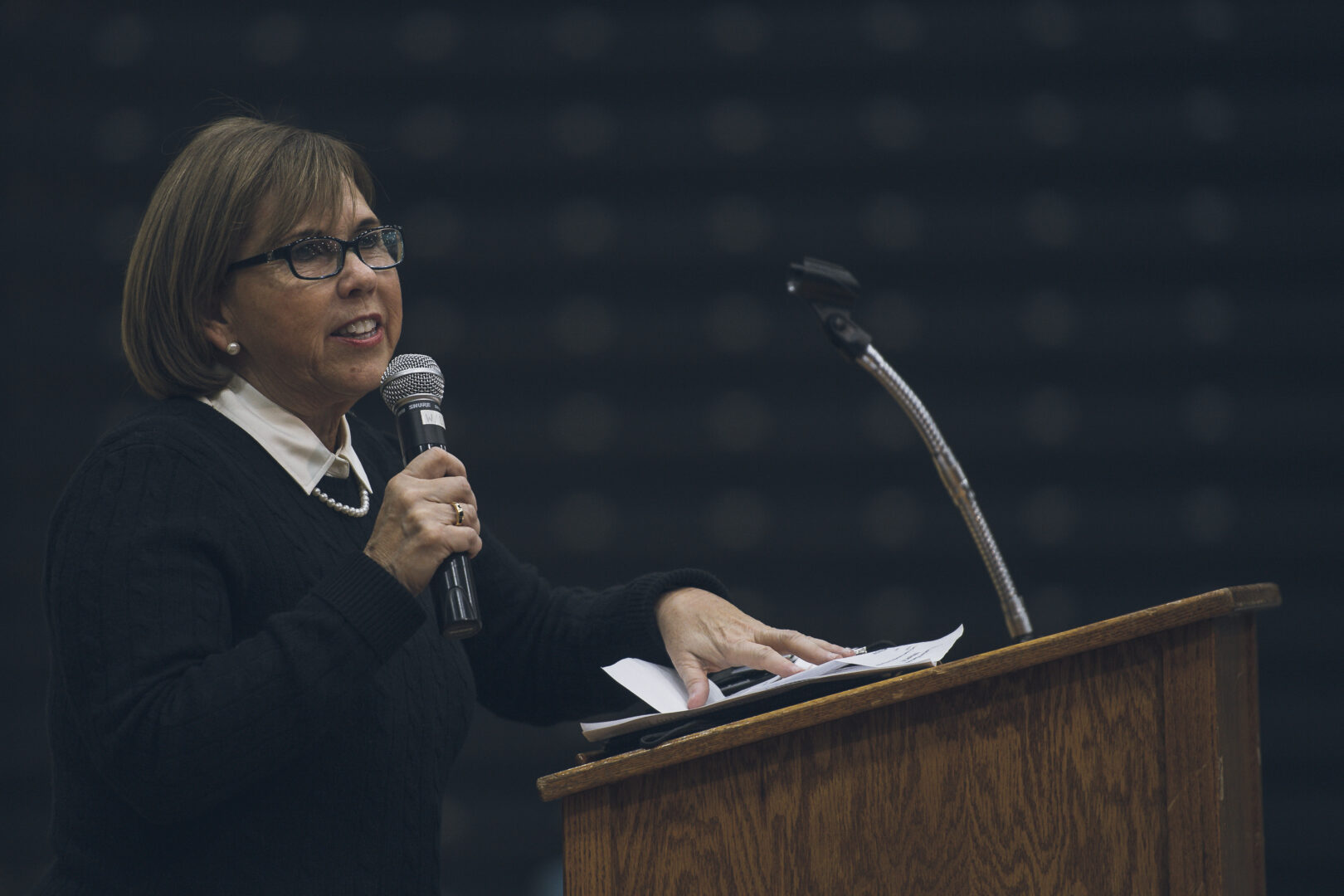
Cross led the field hockey program to a 66-60-16 record and was named Big Ten Coach of the Year in 1987. However, field hockey was dropped as a program at Purdue the following year, and Cross accepted a job as an assistant director in the John Purdue Club. She was elevated to director in 1993 and then associate athletics director of marketing and development. She served as the senior woman administrator from 2000 until she retired from the athletics department in 2022.
“I’m incredibly proud of what the athletics department has done in the last 50 years,” Cross says. “Many people predicted that Title IX would be the demise of men’s programs, but we’ve brought more donors and more recognition to the table. We have loved the opportunity to represent Purdue.”
Musical chairs
Before Mertler left Purdue in 1998, she performed a couple of tasks that may have helped accelerate the meteoric rise of the basketball program. A Mansfield, Ohio, native, Mertler met with a fellow alum from her high school and walked through Mackey Arena, singing the school fight song along the way. The recruit turned out to be Purdue’s first All-American in the sport, Joy Holmes-Harris.
And Mertler gave in to a mother who asked if her daughter could attend a summer basketball camp, even though she was in fourth grade and not the required fifth. As long as your daughter won’t get homesick, fine, said Mertler. That camp attendee was another future All-American, Stephanie White.
Just as Mertler’s timing was impeccable, Joni Comstock found a similar fortune. She started her career as women’s volleyball and men’s tennis coach at Lincoln College in Illinois before heading to the University of Illinois for a doctorate in education. She had received it and worked as associate athletics director for the Fighting Illini when Purdue was looking for Mertler’s replacement.
“I wanted to stay in the Big Ten because I think it’s the best conference in the country for its combination of athletics and academics,” Comstock says. “I thought it was a fantastic opportunity.”
Top 10
- 1New
Paul Finebaum
CFB is at very dangerous point
- 2Hot
Bracketology update
No. 1 seeds change in update
- 3Trending
Stolen cars
Carson Beck, Hanna Cavinder cars stolen
- 4
Texas football
Longhorns cancel spring game
- 5
CFP seeding
SEC, Big Ten make hopes clear
Get the On3 Top 10 to your inbox every morning
By clicking "Subscribe to Newsletter", I agree to On3's Privacy Notice, Terms, and use of my personal information described therein.
Comstock joined Purdue in 1989, just at the time the women’s basketball program flourished under coach Lin Dunn’s leadership. While there was initially some hesitance to include women’s athletics at the university, Comstock found that the department had its share of prominent supporters.
“When we hired Morgan Burke as the new athletics director (in 1993), Gene Keady spoke to the search committee and said we needed an AD who would back all the teams. Coach Keady wanted what was best for all the programs. And Morgan was a great advocate for women’s sports,” Comstock says.
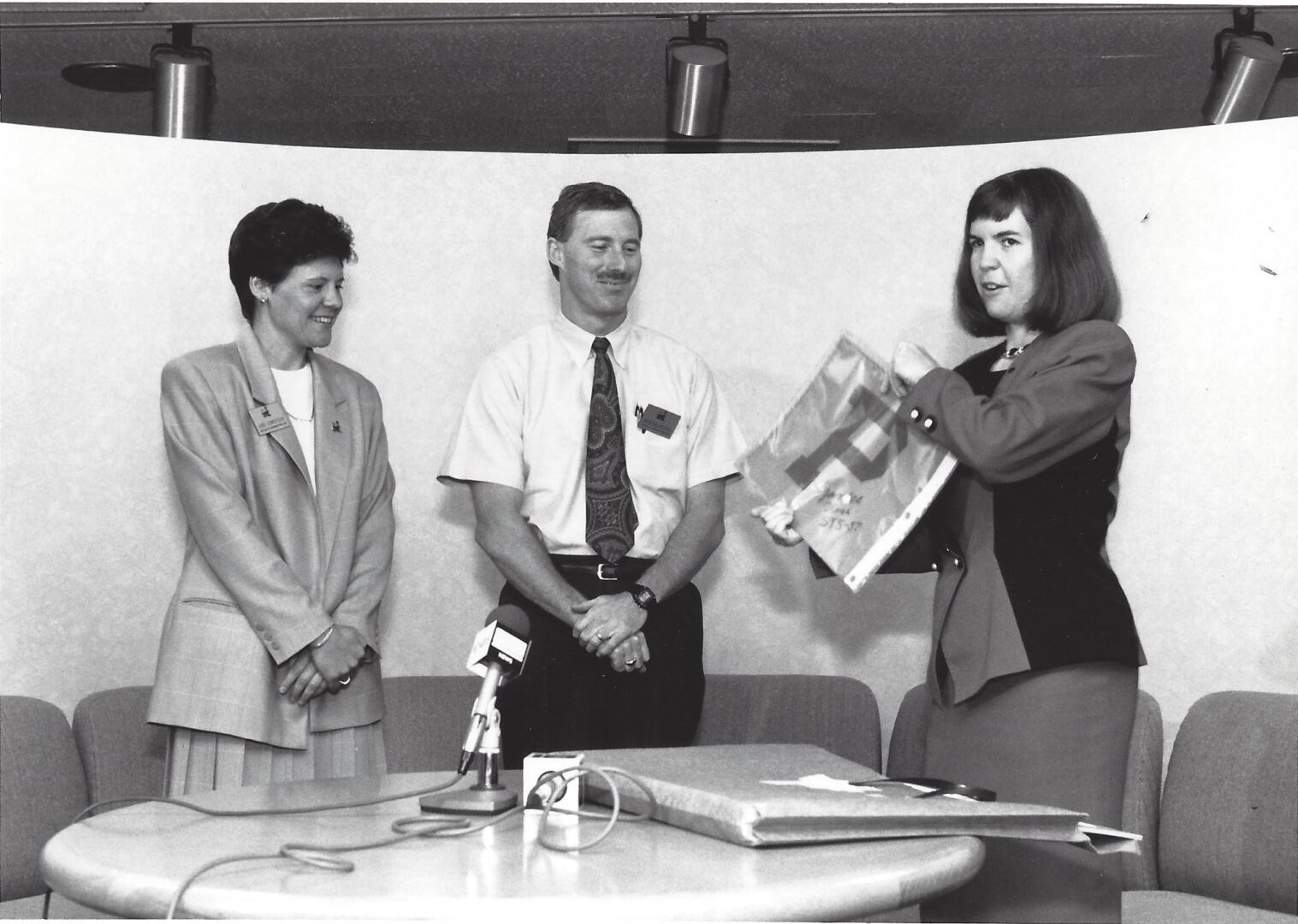
As Keady won titles and awards with the men’s squad, the women’s team won its first Big Ten championship in 1991 and went to the Final Four in 1994 under Dunn. At the end of the 1996 season, though, Burke and Comstock decided a change was in order, and they hired Nell Fortner, an assistant from Louisiana Tech. Despite mass defections following Dunn’s departure, the Boilermakers shared the Big Ten championship in 1996-97, largely aided by freshmen Ukari Figgs and camp attendee White.
But Fortner’s stay was short. She was lured away after one season to coach the U.S. national team. Purdue elevated assistant coach Carolyn Peck to the head coach position, but she, too, was hired away to coach the Orlando Miracle. Although Peck was going to leave at the end of the season, the decision was made to allow her to stay, and the result was a national championship in 1999.
Comstock takes great pride in the championship and in the addition of two sports during her tenure. Softball, under coach Carol Bruggeman, was added in 1994, and soccer, with coach Rob Klatte, made its debut in 1998.
“Finding the right coaches was the key. Carol and Rob were perfect fits to get those programs off the ground,” Comstock says.
Comstock led the women’s sports programs at Purdue until 2000, when she left to become the athletics director at UNC Asheville. She then served in the same role at American University until 2006, when she began an 18-year career at the NCAA as senior vice president of championships, retiring in 2024.
She has fond memories of her days as a Boilermaker.
“The years I spent at Purdue were some of the most significant of my life,” she says.
Building on tradition
Tiffini Grimes spent some of her most enjoyable hours at Purdue in Mackey Arena and Ross-Ade Stadium.
“I was in school at the same time as Katie Gearlds, and I loved to watch her as a player,” says Grimes, who was named deputy athletics director and senior woman administrator in 2022. “Now I get to work with her every day.”
A native of Fort Wayne, Grimes followed her Purdue undergraduate degree with a master’s in sports administration and a law degree, both from Valparaiso University. She worked as a law judge, compliance director at Georgia Tech and Penn State, and assistant director of enforcement for the NCAA before spending eight years at Alabama, where she served as deputy AD and senior woman administrator.
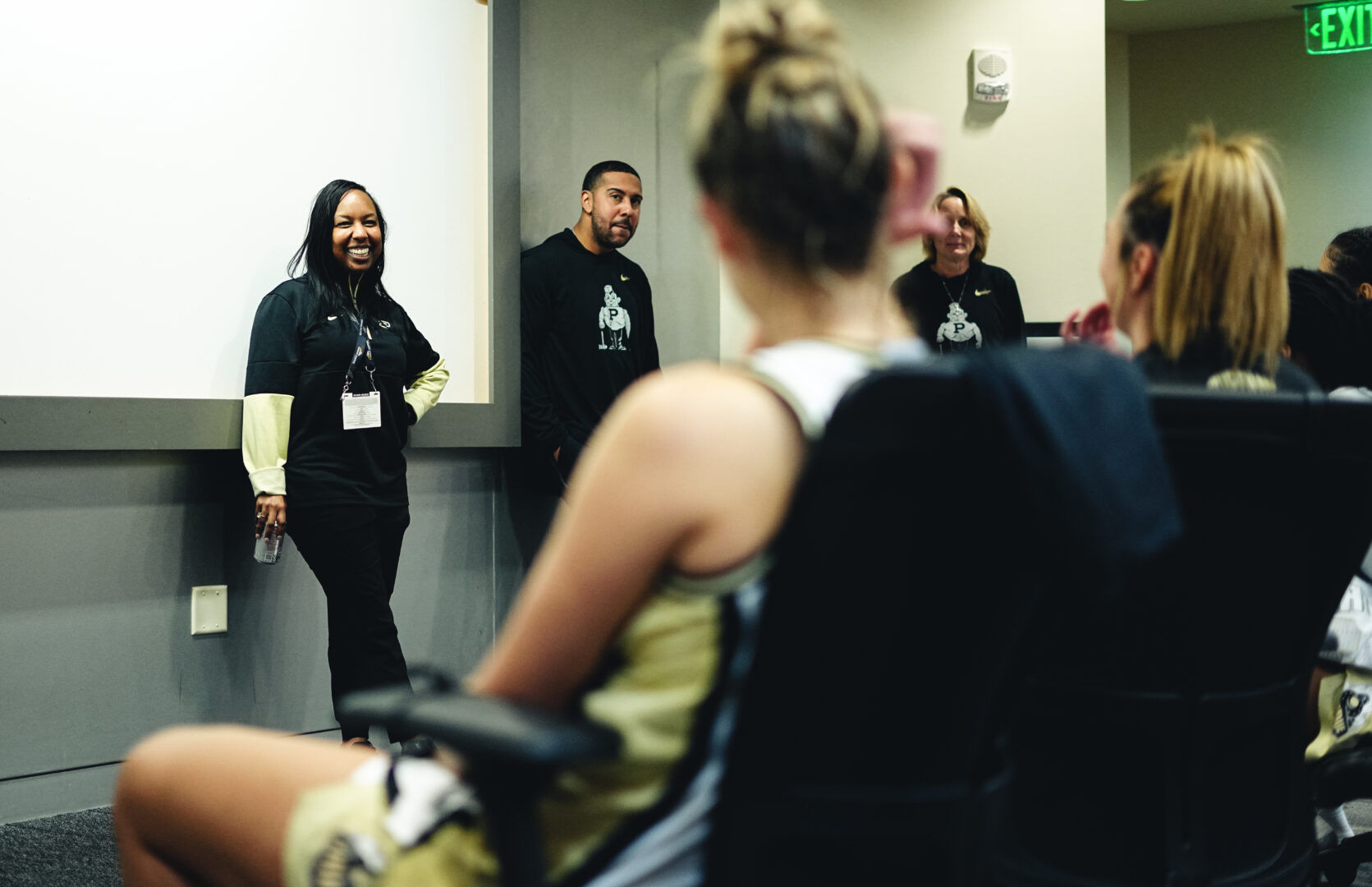
That background has helped her navigate the current collegiate structure, including revenue sharing and NIL (name, image and likeness). They are different issues than those that her predecessors faced, but Grimes appreciates the foundation they built.
“When you think of Carol Mertler, Joni Comstock and Nancy Cross, you think of integrity and the prioritization of student-athletes,” Grimes says. “Almost every time I speak to an alum, they bring up at least one of those amazing women and role models.”
Despite the current challenges of collegiate athletics, Grimes believes that Purdue is in a good position under the leadership of athletics director Mike Bobinski.
“Leadership starts at the top. I’m proud to work for Mike. The student-athletes are our why, and part of the privilege of working at Purdue is we never get away from the concept of the holistic student-athlete,” she says.
Grimes is pleased to see her programs’ outreach efforts, including efforts by softball coach Magali Frezzotti to get out into the community and around the state in youth programs. She’s also thrilled when she looks in the stands and sees male and female children wearing their favorite players’ uniforms.
“Our student-athletes wow me. They are spectacular, and I hope our fan base continues to support them,” she says. “Not only are they great athletes, but they leave here as dynamic people who make life-changing, world-shaking accomplishments. And that’s due to the great pioneers who have gone before us and paved the way.”
By Tim Newton, [email protected]

























